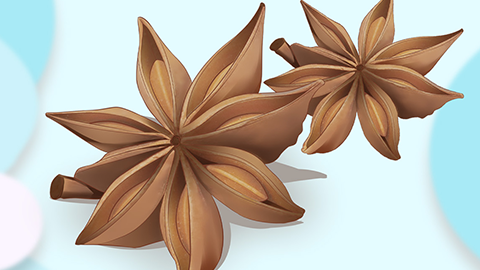What is the difference between fennel and star anise?
Generally speaking, the main differences between fennel and star anise lie in their appearance, nutritional components, effects, smell, and uses. The specific analysis is as follows:
1. Appearance
Fennel is usually a slender herbaceous plant with upright stems, feather-shaped split leaves, and small elongated seeds that are grayish green in color. Star anise, on the other hand, is the fruit of a tree, shaped like an eight-pointed star, with a thick peel and one seed contained in each point. Its color is reddish brown or yellowish brown.
2. Nutritional Components
Fennel is rich in vitamins such as vitamin A and vitamin C, as well as dietary fiber and minerals like potassium and calcium. Star anise mainly contains volatile oils, with relatively fewer vitamins and minerals, and has a slightly higher calorie content.

3. Effects
Fennel primarily functions to regulate qi, harmonize the stomach, dispel cold, and relieve pain, helping to alleviate gastrointestinal discomfort. Star anise is warm in nature; besides dispelling cold, its volatile oils also have certain antibacterial properties, which can help enhance immunity. However, it should be used in moderation to avoid excessive internal heat.
4. Smell
Fennel has a fresh and mild aroma with a unique spicy fragrance. Star anise has a rich, mellow scent with a sweet undertone mixed into its spicy fragrance, making it more intense and long-lasting—easily distinguishable among common spices.
5. Uses
Fennel seeds can be used as seasoning, and its tender stems and leaves can be consumed as vegetables. Star anise is primarily used as a spice to enhance the aroma of dishes such as braised or marinated foods, and its volatile oils can also be extracted for use in the food industry.
To avoid flavor issues or health risks, it is recommended to strictly follow recipes or professional guidance when using these spices in cooking or for medicinal purposes, and to select the appropriate spice according to specific needs. If you have questions about spice usage, you may consult a chef, nutritionist, or doctor.







